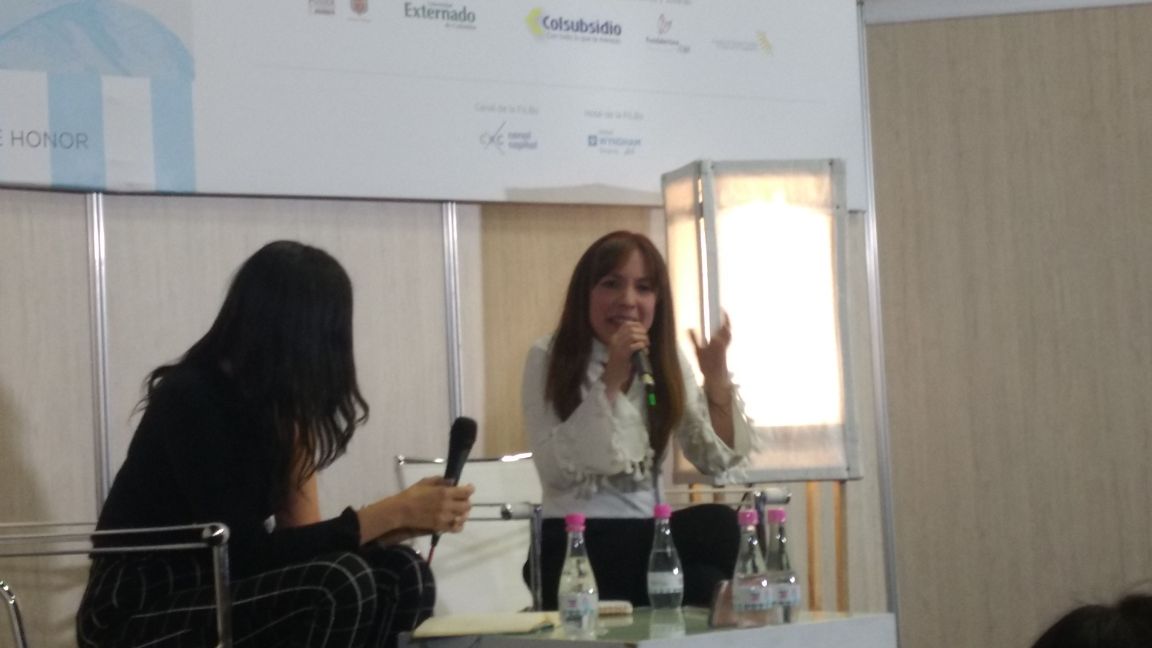
Vanessa Rosales (left) and Mariángela Urbina (right) talk about feminism and social media.
FILBo addressed the issue of feminism, women’s rights and male anger with a stimulating chat between two prominent women championing the cause of feminism in Colombia.
The Bogotá Post was present at the enriching discussion between Mariángela Urbina and Vanessa Rosales which was held on Saturday at FILBo 2018 to discuss feminism, why it makes many men furious and the violent language used online against it.
Vanessa Rosales, style and fashion writer from Cartagena, started the conversation by saying the only thing feminism has ever tried to do is to make people free and equal; this message cannot be taken lightly.
This exchange on a cold Friday afternoon opened up with the word ‘feminazi’ – used by many a detractor of feminism and feminists. Mariángela Urbina, one of the three creators behind the group Las Igualadas, thinks “how funny is it (…) so are you telling me people invented such a resounding word to discredit a historic struggle?” She says there is no denying it is an ingenious word because it is catchy, and apparently is brilliant in that prefix and suffix complement each other.
She says that one of the things they have learned during this last year with Las Igualadas is that the internet is one more place we all live in. Just as women face harassment on the street or in the workplace, so this is also true online. The rise of ‘feminazi’ took her completely off guard, she says. It is difficult for her to see that a show such as Las Igualadas, which defends equality, which seeks for everyone to enjoy the same rights, ends up generating this type of insult – likening feminists fighting for rights to fascists that would restrict them.
Related: Get the best out of FILBo 2018
In connection with the negative power this has had, Vanessa adds to the debate, saying that it is really interesting to see how the press constantly lends a hand to this discrediting of women; she mentions that in the 70s, for example, it was a lot more convenient to promote the shocking and unrepresentative radical feminism like Dworkin. Vanessa has always insisted feminism should be contextualised, there are different theoretical hues in multiple layers, but since the 70s, media has set to caricature feminists as women who hate men, who are generally gay, who are tomboys, who are full of rage.
Both agree that internet users are everyday witnesses to the hatred and rage that have been unleashed by anonymity, and in the words of Vanessa, “how easy it is to be behind your little screen and vent all your frustrations in a poisonous way.” She admits this is one of the things that struck her the most when they were preparing this talk; comments in social networks are violent, full of rage, with threats of rape and murder.
Mariángela recalls one of the first comments to a video Las Igualadas produced called ‘The Most Stupid Lies about Women and Love’: “Insolent feminazi, a bullet in your forehead.” And she wonders how people still say machismo and aggressiveness towards women no longer exist.
“One of the most common ways to threaten women who have a public opinion is saying ‘I´m going to rape you’” adds Vanessa. Mariángela recalls a very violent comment from a man regarding a video they published in which they talked about groping in public buses: “I and four more friends are going to rape you so you learn to complain about serious issues.”
Related: Read all our FILBo coverage here
Vanessa comments that with this, we are now realising there are larger structures that transcend us, where violence towards anything feminine is very common, from the way the period is perceived in daily life to the moments in which women decide to be in power. She cites the very clear example of the image on the Trump campaign portraying him beheading Hillary, just as Perseus would Medusa.
The question to be asked, she says, is why does talking about these topics makes men so furious? Why does this raise so much hatred? Mariángela says her answer to that is that having privileges makes life easy and these ideas threaten the possession of these privileges. In this way, equality looks like a loss of a privilege.
Vanessa believes it has do with how men are taught to see women, always in the ‘whore or saint’ dichotomy. Mariángela says women have also been taught that dichotomy. Many times we see a woman empowered, in possession of her desire, in command of her sexuality and we think of her as a slut. We women also assume that dichotomic model regarding sexuality: we have been taught to compete, not against ourselves, not against men, but against our own gender.
In the same train of thought, Mariángela asks where we should draw the line between self-empowerment and objectification. Vanessa turns back to her initial point: “It is necessary to understand what I call pluralism in feminism; what is liberating for one woman may not be liberating for another; we need to understand there are nuances to every situation, and we need to contextualise, that’s why the concept of beauty can also be seen more and more from different perspectives.” She thinks also that social networks have broadened the measure of beauty, and that is helping women heal beauty wounds. The problem – she says – is that social networks also fall into exacerbating and activating beauty as the greatest source of feminine identity. “We all fall there, I’ve fallen there, too.”
It is of course impossible to reach a consensus about all these issues. Vanessa closed reflecting that the word ‘feminism’ is so broad that it ends up being blurred. A better approach would definitely be start talking about different feminisms, representing the experiences of various women, and start spreading the word about all of these feminisms.





